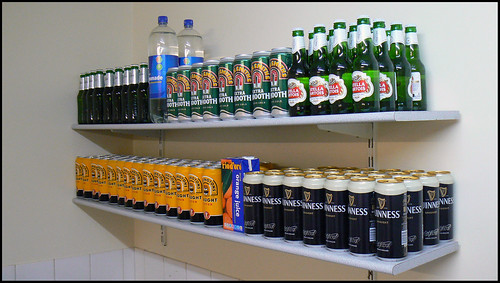 Alcohol is connected to depression in two ways—either a person drinks too much and as a result feels depressed or a person drinks to relieve anxiety and depression. Either way, alcohol affects the chemistry in the brain, which increases the risk for depression. Hangovers create a vicious cycle of waking up feeling sick, anxious, jittery and guilty. Life can become depressing because of the problems alcohol creates—relationship difficulties with family and friends, problems at work, memory issues and sexual problems. For many depressed drinkers, cutting out alcohol consumption can drastically improve their mood. Most start to feel better within a few weeks of cutting out alcohol. The best idea is stop drinking first to see whether that is what is causing the depression. Friends and family may find it easier to get along with a sober person. If after four weeks of not drinking, the depression has not lifted, a General Practitioner may suggest cognitive therapy or prescribe medication. Some of the symptoms of alcoholism include using alcohol as a way to cope with anxiety, anger, frustration, depression or a lack of self-confidence; relationships are negatively affected; feelings of guilt, depression or self-loathing; large amounts of time spent drinking; drinking early in the day and hiding the amount being consumed from friends and family. If this sounds like you or someone you love, you can contact your local Alcoholics Anonymous for help.
Alcohol is connected to depression in two ways—either a person drinks too much and as a result feels depressed or a person drinks to relieve anxiety and depression. Either way, alcohol affects the chemistry in the brain, which increases the risk for depression. Hangovers create a vicious cycle of waking up feeling sick, anxious, jittery and guilty. Life can become depressing because of the problems alcohol creates—relationship difficulties with family and friends, problems at work, memory issues and sexual problems. For many depressed drinkers, cutting out alcohol consumption can drastically improve their mood. Most start to feel better within a few weeks of cutting out alcohol. The best idea is stop drinking first to see whether that is what is causing the depression. Friends and family may find it easier to get along with a sober person. If after four weeks of not drinking, the depression has not lifted, a General Practitioner may suggest cognitive therapy or prescribe medication. Some of the symptoms of alcoholism include using alcohol as a way to cope with anxiety, anger, frustration, depression or a lack of self-confidence; relationships are negatively affected; feelings of guilt, depression or self-loathing; large amounts of time spent drinking; drinking early in the day and hiding the amount being consumed from friends and family. If this sounds like you or someone you love, you can contact your local Alcoholics Anonymous for help.Thursday, September 17, 2009
Alcohol and Depression
 Alcohol is connected to depression in two ways—either a person drinks too much and as a result feels depressed or a person drinks to relieve anxiety and depression. Either way, alcohol affects the chemistry in the brain, which increases the risk for depression. Hangovers create a vicious cycle of waking up feeling sick, anxious, jittery and guilty. Life can become depressing because of the problems alcohol creates—relationship difficulties with family and friends, problems at work, memory issues and sexual problems. For many depressed drinkers, cutting out alcohol consumption can drastically improve their mood. Most start to feel better within a few weeks of cutting out alcohol. The best idea is stop drinking first to see whether that is what is causing the depression. Friends and family may find it easier to get along with a sober person. If after four weeks of not drinking, the depression has not lifted, a General Practitioner may suggest cognitive therapy or prescribe medication. Some of the symptoms of alcoholism include using alcohol as a way to cope with anxiety, anger, frustration, depression or a lack of self-confidence; relationships are negatively affected; feelings of guilt, depression or self-loathing; large amounts of time spent drinking; drinking early in the day and hiding the amount being consumed from friends and family. If this sounds like you or someone you love, you can contact your local Alcoholics Anonymous for help.
Alcohol is connected to depression in two ways—either a person drinks too much and as a result feels depressed or a person drinks to relieve anxiety and depression. Either way, alcohol affects the chemistry in the brain, which increases the risk for depression. Hangovers create a vicious cycle of waking up feeling sick, anxious, jittery and guilty. Life can become depressing because of the problems alcohol creates—relationship difficulties with family and friends, problems at work, memory issues and sexual problems. For many depressed drinkers, cutting out alcohol consumption can drastically improve their mood. Most start to feel better within a few weeks of cutting out alcohol. The best idea is stop drinking first to see whether that is what is causing the depression. Friends and family may find it easier to get along with a sober person. If after four weeks of not drinking, the depression has not lifted, a General Practitioner may suggest cognitive therapy or prescribe medication. Some of the symptoms of alcoholism include using alcohol as a way to cope with anxiety, anger, frustration, depression or a lack of self-confidence; relationships are negatively affected; feelings of guilt, depression or self-loathing; large amounts of time spent drinking; drinking early in the day and hiding the amount being consumed from friends and family. If this sounds like you or someone you love, you can contact your local Alcoholics Anonymous for help.
Labels:
Fat,
Food,
Food Safety,
Health Tips,
Heart,
Men's Health,
tweets,
Women's health
Subscribe to:
Post Comments (Atom)
No comments:
Post a Comment